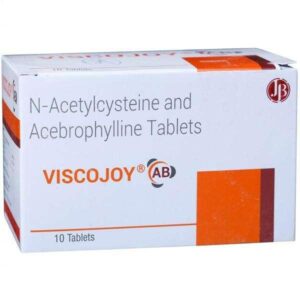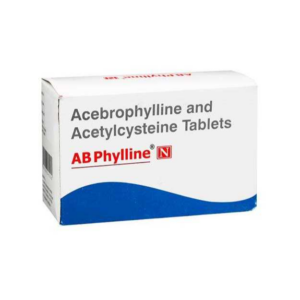N-ACETYLCYSTEINE + ACEBROPHYLLINE
N-Acetylcysteine: N-Acetylcysteine (NAC) is a medication that is commonly used as a mucolytic agent, meaning it helps to thin and loosen mucus in the respiratory tract. It is also used as an antidote for acetaminophen (paracetamol) overdose and as a supplement for certain conditions.
NAC works by increasing the production of glutathione, an antioxidant that helps to protect cells from damage caused by reactive oxygen species. It also helps to break down and dissolve disulfide bonds in mucus, making it easier to clear from the respiratory tract.
In the treatment of acute acetaminophen overdose, NAC acts as a precursor to glutathione, helping to replenish its levels in the liver and prevent liver damage.
The dosage of NAC varies depending on the condition being treated. For chronic respiratory conditions, such as chronic obstructive pulmonary disease (COPD), the typical oral dose is 600-1200 mg per day. In the case of acute acetaminophen overdose, the dosage is higher and usually given intravenously.
Common side effects of NAC include nausea, vomiting, and abdominal pain. Rarely, it can cause allergic reactions such as rash, itching, or swelling. In some cases, high doses of NAC may lead to respiratory distress or bronchospasm, especially in individuals with a history of asthma or other respiratory conditions. It is important to consult with a healthcare professional before starting NAC therapy to assess any potential risks or interactions with other medications.
Acebrophylline: Acebrophylline is a bronchodilator drug that is primarily used in the treatment of respiratory conditions such as chronic obstructive pulmonary disease (COPD) and asthma.
Acebrophylline works by relaxing the smooth muscles in the airways, which helps to widen the air passages and improve breathing. It also reduces inflammation in the airways, making it easier for air to flow in and out of the lungs.
The usual recommended dose of Acebrophylline is 100mg to 200mg taken twice daily, although this may vary depending on the individual and the severity of the condition. It is important to follow the dosage instructions provided by the healthcare professional.
As with any medication, Acebrophylline may cause some side effects. Common side effects may include nausea, vomiting, abdominal discomfort, headache, dizziness, and skin rashes. These side effects are usually mild and temporary. However, if any severe or persistent side effects occur, it is important to consult a healthcare professional.
It is worth noting that Acebrophylline may interact with other medications, so it is important to inform the healthcare professional about all other medications being taken. Additionally, Acebrophylline is not recommended for use in individuals with a history of heart disease, liver or kidney impairment, and gastric ulcer.
Overall, Acebrophylline is an effective bronchodilator used to improve respiratory function in conditions such as COPD and asthma. It works by relaxing the smooth muscles in the airways and reducing inflammation. However, it is important to follow the recommended dosage and seek medical advice if any side effects occur.


